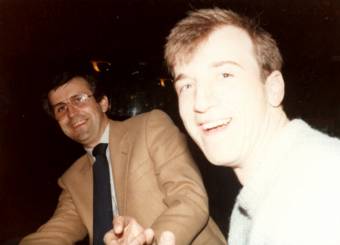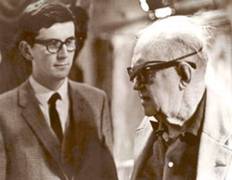"No more Hitchcock." "Worse than that
- no more Hitchcock films." |
Paraphrasing
a comment made by William Wyler upon the death of Ernst Lubitch. |
| |
|
| Dear
Richard, |
|
| Worse
than that – no more Franklin films and even worse,
no more Franklin e-mails. |
|
| This is our 13th year of twice weekly e-mailing
(sometimes more when the arguments had flames beneath
them) and my final communiqué, one you will
not get to read - unless, of course, we were both
wildly wrong and you're strumming a harp reading
over my shoulder chuckling to yourself. Say hullo
to Hitch, Orson, Papa Ford and Frank Capra for me.
Thank them and thank you for being my mentor and
my friend. |
|
| All
great things, (in this life and the next), |
|
| Alan |
|
"If
you will take me as your teacher,
you will not kick against the pricks." |
Aeschylus
(525-456 B.C.), Greek tragedian. |
Also
featured in The Bible, Acts, 26:14 |
I
know, 'prick' sounds rude. A 'prick', in this context,
is a small wooden, sharpened pole with which men controlled
animals. Kick against them and you hurt yourself much
more than the targets you strike out against. A 'prick'
in terms of this obituary (it's heartbreaking just
to type that word) is a be-suited executive (a 'suit')
in the 20th to 21st century's film industry whose
errant and childish whims control and despoil lives
and careers as guilt free and as utterly assuredly
as a chainsaw slices through stubborn bark. Kick against
them (despite one's on-board weapons of intelligence,
craftsmanship, artistry, charm, a sense of fair play
or even physical might) and you end up bloodied. These
pseudo-powerfully perceived peacocks with the film-making
talent of squashed fruit didn't kill Richard (that
was 'Jack The Dancer', as he called his own internal
nemesis), but certain corporate buffoons made his
final decade into one semi-paralysing round of head
to wall-banging after another.
Here
was a talented film-maker buffered and pin-balled
by power players with a level of cinematic passion
at an inverse ratio to their power over him. In a
nod to cliché, "He who pays the piper
calls the tune": That, I can live with. What
I can't abide is "He who pays the piper, calls
the tune, assumes moral and creative authority over
the piper, reminds the piper of his own superior but
scant knowledge of said tune, gets the tune market
tested, preview listened, excised of any and every
idiosyncrasy and homogenises the 'product' to anodynasty
- and then kicks the piper in the balls just simply
because he/she can. 'Anodynasty' is not a real word
but the fanciful creation of a dynasty of anodyne
was too tempting to resist.
|
|
The
young Richard Franklin meets two of his cinematic
heroes. |
My
valued and dear friend, Richard Franklin, who died
last month, was a true friend to myself (despite the
10,500 miles between us and that is as the crow flies,
some fit crow) and also to cinema through his work,
historical knowledge and appreciation (I mean, he
got to meet Hitchcock and John Ford through his own
enterprise). He just happened to be born into an uncivilised
movie-making era. He was an intellectual director
(aieee!) with the smarts to put most to shame and
had the political cunning of a cornered fox. The problem
here is with having to use the word 'cornered'. The
industry Richard once revered - in whose hallowed
soundstages toiled the greats of old, the afore mentioned
Hitchcocks, the Fords and the Welleses - changed radically
throughout Richard's career. Via an accelerated-time
metaphor, Richard was a master craftsman who made
beautiful saddles but all the horses were put out
to graze while cars took their place. This isn't to
say that Richard's craft was old fashioned; his oeuvre
is multi-layered and rewards multiple viewings. Richard
could never be Michael Bay and no higher blessing
can I bestow on a man who spent an entire summer's
day telling me in precise and glorious detail how
each special effect of The Birds was done. I was utterly spellbound (pun intended,
Hitchcock aficionados).
Richard's
stylistic film grammar was often ahead of its time
but this and he were continually stymied by the small
mindedness of those who deigned to allow him to practise
his craft. It's no wonder when Richard's heroes were
all giants in their field (Richard's film-making ethos
was inspired by these greats, as it should've been),
giants whom in our 2007 field, would be brought to
their knees by the shameless commercial crassness
that is Hollywood. The last American 'great' died
eight years ago (Hollywood-speaking of course; as
I write it's the day after Ingmar Bergman passed on
and the day on which Michaelangelo Antonioni joined
him). To have creative and financial autonomy, this
last (outsider) Hollywood great relied upon his oeuvre
(the brilliance of Stanley Kubrick's movies earned
him the right to control his own work) and let's not
forget it didn't hurt that he enjoyed a unique relationship
with a few key personnel in the higher echelons of
Warner Brothers.
In
the mid-80s Richard arrived in the UK after having
harboured an ambition to work in London for some time
(in many ways he fitted certain cultural stereotypes
of the Australian - his middle name was Bruce for
god's sake!). Verity Lambert at the once huge Thorn
EMI had given the go to a curious script about an
idiosyncratic chimpanzee called Link.
It was to be the defining project that taught me all
I wanted/needed to know about human behaviour. Let's
say cautiously, it was a tumultuous shoot with egos
smashing into each other like dodgem cars. Richard's
co-producer Rick McCallum had introduced me to Richard
- is that first name one that's familiar in another
context?
In
1984 I was lucky enough to secure employment as a
director's assistant on a UK based feature produced
by none other than Mr. McCallum (of latter-day Star
Wars prequels fame). Known now more as a
party-faithful Lucasfilm mouthpiece (Rick is the boisterous
yin to Lucas's dour yang), Rick was a force of nature
in his early days, effortlessly charming, utterly
ruthless and to me, especially funny. There are three
incidents, only one of which I can re-tell without
blushing, that define a certain era of my life. One
involved a tear-inducing outcome which director and
friend Gavin Millar described as "Only Rick could
disgust himself that badly," The other involved
a joke about a frog which may bring tears to your
eyes (but you're not going to hear it here).
The
only clean McCallum story I can tell is when Richard,
together with his studio driver, challenged Rick (and
his driver) to a snooker match on location in Scotland.
This was the 80s. Men challenged each other and Cockney
drivers and US and Aussie Hollywood 'players' were
anxious to strut their stuff. Terry, Richard's driver,
(bless you Tel, if you are reading, unlikely but bless
you anyway) pulled off a shot of such stunning accuracy
and aplomb that left every one else slack jawed with
awed appreciation. But not Rick. Rick just chalked
up his cue and, sneering Snape-like, simply announced
"That doesn't mean Jack Shit to me..." It
was all Richard could do to stay standing up. In many
ways, Rick is the film industry's Jeffery Archer;
so easy to dislike because of rank, behaviour and
circumstance but in a nagging way, the world would
be poorer without him. McCallum's IMDB message board
seems full of disgruntled Star Wars fans who see him as the man who screwed up their beloved
franchise. I see him as the man who introduced me
to my longstanding friend Richard. After Link,
Rick and Richard's paths would never cross again but
to go back to those first meetings...
The
chances of my becoming Richard's assistant were slim
because (and note this was 1985 if that makes any
difference) Richard plainly told me "My assistants
are usually girls..." Well, it's still like that.
But I was tenacious and proved myself a willing student
if not that able at first. If you allow me a short
stroll down memory lane, I will try to determine how
Richard became a beacon of sense in a world of nonsense
and how that nonsense eventually took arms against
him (and continues to overwhelm us all too).
The
Odeon Cinema, Cardiff - mid-1980s:
Assembled
hacks are ready to sneer at and critically crucify
a sequel to one of the most famous and influential
movies of all time, Alfred Hitchcock's Psycho.
But at Richard's Psycho 2, we gaped
and went "Aargh!" and thought a lot of the
experience and when the ending arrived ("Don't
ever hit your mother with a shovel, it leaves a dull
impression on her mind...") we cheered. Press
hacks do not, on the whole, cheer anything. The name
'Richard Franklin' was marked out for critical attention.
I went back and viewed his earlier work and found
it stimulating and fun (Road Games stood out, a Hitchcockian thriller with a modern sensibility).
Richard's name made it on my 'Directors to watch out
for' list. Serendipity placed him in an adjoining
office to McCallum's during Richard's hunt for a budget
to his English anthropological thriller. Once Rick
told me who it was, it was all I could do not to break
down the door. I admire film-makers, sometimes more
for the effort of will, these days, it takes to make
the damn things. I say this with some experience in
the industry but on a far lower shelf than Richard.
 |
Richard
Franklin (left) with his very happy assistant,
circa 1985 |
I
got the job (and Richard's ankles probably still have
the teeth marks). Six months followed (a prospective
novel full of drama and incident, all of which could
land me in court if I 'released the hounds' so to
speak). But throughout, Richard was gracious, disbelieving
at my naiveté ("Don't come the raw prawn
with me," was one of his favourites and I still
don't know what it means) somewhat frustrated by the
British crew (far more bullish and significantly less
subservient than their American counterparts). He'd
spotted a budding film student in his midst. He shared
the entire film making process with me and to say
I learned a lot is a bottomless pit of understatement.
It
was the last day of shooting. The daughter of Richard's
agent's partner (stay with me) had got me tickets
for Springsteen's 'Born in the USA' tour. We wrapped
quietly on a back projection stage at Shepperton and
Richard passed me a letter - a thick envelope which
I was gearing up to read on the train to Wembley,
Walkman on, the Euryhthmics' "There Must Be An
Angel" rocketing into my head. Richard and I
had planned to meet up again for the mix and the music
record but for this month or so it was au revoir.
I wondered what wit and wisdom was contained in the
envelope - musings on life, the universe and everything
or a general stunned barrel of prose on how different
crews were in L.A. I opened it up.
There
was a single sheet of his own personalised notepaper.
The thickness was due to the ten fifty pound notes
tucked inside. On the note it said:
| |
"Dear
Alan, |
| |
To
a true friend and valued confidant, and the best
assistant I ever had. |
| |
Find
yourself, |
| |
Fondly, |
| |
Richard" |
I
found myself and now the man who did more to help
me do just that is gone. He will be sorely missed.
***
P.S.
Richard's editor and friend in Australia, David Pulbrook,
made a short movie celebrating Richard's life. Have
a look.
http://www.youtube.com/watch?v=xnADfw7RkKQ
|
